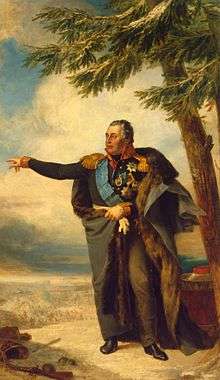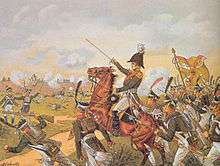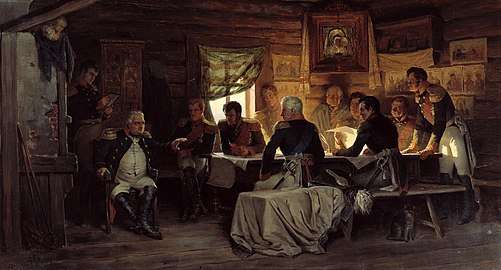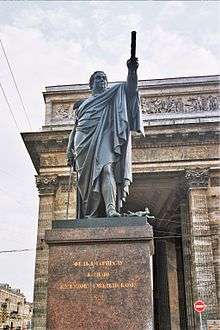Mikhail Kutuzov
Prince Mikhail Illarionovich Golenishchev-Kutuzov (Mikhail Illarion Golenishchev-Kutuzov Graf von Smolensk) (Russian: князь Михаи́л Илларио́нович Голени́щев-Куту́зов; 16 September [O.S. 5 September] 1745 – 28 April [O.S. 16 April] 1813) was a Field Marshal of the Russian Empire. He served as one of the finest military officers and diplomats of Russia under the reign of three Romanov Tsars: Catherine II, Paul I and Alexander I. His military career was closely associated with the rising period of Russia from the end of the 18th century to the beginning of the 19th century. Kutuzov is considered to have been one of the best Russian generals.[1]
Mikhail Illarionovich Kutuzov | |
|---|---|
 Portrait by George Dawe | |
| Born | 16 September 1745 Saint Petersburg, Russian Empire |
| Died | 28 April 1813 (aged 67) Bunzlau, Kingdom of Prussia (now Bolesławiec, Poland) |
| Buried | |
| Allegiance | |
| Service/ | |
| Years of service | 1759–1813 |
| Rank | Generalfeldmarschall |
| Commands held | Commander in Chief of Austro-Russian force in the Third Coalition Commander in Chief of Imperial Russian Army in Patriotic war of 1812 |
| Battles/wars | Russo-Turkish War (1768–1774)
|
| Awards | Duke of Smolensk 1st class Order of St. George |
He was born in Saint Petersburg in 1745 to a family of Novgorod nobility. His father was a Russian general and senator. Kutuzov began military schooling at age 12 and joined the Imperial Russian Army in 1759. Three years later Kutuzov became a company commander in the Astrakhan Infantry Regiment under Alexander Suvorov. He took part in crushing the Polish Bar Confederation rebellion. During the Russo-Turkish War of 1768–1774 he served in the staff of Pyotr Rumyantsev at Moldova for the battles of Larga and Kagul.[2] In July 1774 at Crimea, Kutuzov was severely wounded by a bullet that went through his temple and out near his right eye, which became permanently scarred. He returned to Crimea in 1776 to assist Suvorov and conducted negotiations with the last Crimean khan Şahin Giray, convincing him to abdicate and submit to Russia.
After Kutuzov became Governor-General of Crimea in 1787, the Russo-Turkish War of 1787–1792 began. He was again severely wounded in 1788 during the Siege of Ochakov when a bullet was shot through both of his temples. Kutuzov came back a year later, taking part in the Battle of Rymnik and Siege of Izmail. Near the end of the war, he led a decisive charge at the Battle of Măcin.[2] Kutuzov was on good terms with Tsar Paul, but had disputes with his successor Tsar Alexander. In 1805, he led Russian forces alongside Austria during the Napoleonic Wars. The allied Russo-Austrian army was defeated by Napoleon at the Battle of Austerlitz. Alexander blamed Kutuzov and demoted him to Moldova for the Russo-Turkish War of 1806–1812. Kutuzov vanquished a four-times larger Turkish army at Rousse and brought an end to the war with a decisive victory at the Battle of the Danube. For his achievements, he was awarded the titles of count and prince.
Kutuzov returned at the request of Alexander for the French invasion of Russia. He was appointed Commander-in-Chief, succeeding Barclay de Tolly and continued his scorched earth policy up to Moscow. Under Kutuzov's command, the Russian army faced the Grande Armée at the Battle of Borodino. He allowed Napoleon to take an abandoned Moscow, which was set on fire. Kutuzov counter-attacked once Napoleon retreated from Moscow, pushing the French out of the Russian homeland.[3] In recognition of this, Kutuzov was awarded the victory title of Prince Smolensky.[2] He stepped down from command due to deteriorating health soon after the French left Russia. Kutuzov died in 1813 at Bunzlau and was buried at the Kazan Cathedral in Saint Petersburg. Kutuzov was highly regarded in the works of Russian and Soviet historians.[3]
Early career
Mikhail Kutuzov was born in Saint Petersburg on 16 September 1745. His father, Lieutenant-General Illarion Matveevich Kutuzov, had served for 30 years with the Corps of Engineers, had seen action against the Turks and served under Peter the Great. Mikhail Kutuzov's mother came from the noble family of Beklemishev. Given his father's distinguished service and his mother's high birth, Kutuzov had contact with the imperial Romanov family from an early age.[4]
In 1757, at the age of 12, Kutuzov entered an elite military-engineering school as a cadet private.[5] He quickly became popular with his peers and teachers alike, proving himself to be highly intelligent, and showed bravery in his school's numerous horse-races. Kutuzov studied military and civil subjects there, learned to speak French, German and English fluently, and later studied Polish, Swedish, and Turkish; his linguistic skills served him well throughout his career.[6][5] In October 1759, he became a corporal.[5]
In 1762, Kutuzov, by then a captain, became part of the Astrakhan Infantry Regiment, which was commanded by Colonel Alexander Suvorov.[5] Kutuzov studied Suvorov's style of command and learned how to be a good commander in battle. Suvorov believed that an effective order should be simple, direct, and concise, and that a commander should care deeply about the health and training of his soldiers. Kutuzov also adopted Suvorov's conviction that a commander should lead his troops from the front (instead of from the rear) to provide an example of bravery for the troops to follow. Suvorov also taught Kutuzov the importance of developing close relationships with those under his command. Kutuzov followed this advice to the benefit of his career. This advice contributed to Kutuzov's appointment as Commander-in-Chief in 1812.[7]
Late in 1762, Kutuzov became aide-de-camp to the military governor of Reval, the Prince of Holstein-Beck, in which role he showed himself to be a capable politician. In 1768 Kutuzov fought in Poland, after the Polish szlachta—the Polish noble class—rebelled against Russian influence. In this conflict, Kutuzov captured several strong defensive positions, thereby proving his skill on the battlefield.[8]
In October 1768, the Ottoman Empire declared war on the Russian Empress Catherine the Great. Two years later, Kutuzov, now a major, joined the army of the soon-to-be-famous Count Pyotr Rumyantsev in the south to fight against the Turks. Though Kutuzov served valiantly in this campaign, he did not receive any medals, as another officer reported to Rumyantsev that Kutuzov mocked Rumyantsev behind his back. Rumyantsev had Lieutenant-Colonel Kutuzov transferred into Prince Vasily Dolgorukov-Krymsky's Russian Second Army fighting the Turks and the Tatars in the Crimea. During this campaign Kutuzov learned how to use the deadly Cossack light cavalry, another skill which would prove useful in the defence of Russia against Napoleon's invading armies in 1812. In 1773 he was ordered to storm the well-defended town of Alushta on the southern coast of the Crimean peninsula. When his troops' advance faltered, Kutuzov grabbed the fallen regimental standard and led the attack. While charging forward, he was shot in the left temple—an almost certainly fatal wound at the time. The bullet went right through his head and exited near the right eye. However, Kutuzov slowly recovered, though frequently overcome by sharp pains and dizziness, and his right eye remained permanently twisted. He left the army later that year due to his wound.[9]
Kutuzov's pain did not subside, and so he decided to travel to Western Europe for better medical care. He arrived in Berlin in 1774, where he spent much time with King Frederick the Great of Prussia, who took great interest in Kutuzov. They spent long periods of time discussing tactics, weaponry, and uniforms. Kutuzov then travelled to Leyden, Holland and to London in England for further treatment. In London Kutuzov first learned of the American Revolutionary War. He would later study the evolution of American general George Washington's attrition campaign against the British. The American experience reinforced the lesson that Rumyantsev had already taught Kutuzov; that one does not need to win battles in order to win a war.[10]
Kutuzov returned to the Russian Army in 1776 and again served under Suvorov—in the Crimea—for the next six years. He learned that letting the common soldier use his natural intellect and initiative made for a more effective army. Suvorov also taught him how to use mobility in order to exploit the constantly changing situation on the battlefield. By 1782 Kutuzov had been promoted to brigadier general as Suvorov recognised Kutuzov's potential as a shrewd and intelligent leader. Indeed, Suvorov wrote that he would not even have to tell Kutuzov what needed to be done in order for him to carry out his objective. In 1787 Kutuzov was again wounded in the left temple, in almost exactly the same place as before, and again doctors feared for his life. However, Kutuzov recovered, though his right eye was even more twisted than before and he had even worse head-pains.[11]
In 1784 he became a major general, in 1787 governor-general of the Crimea; and under Suvorov, whose disciple he became, he won considerable distinction in the Russo-Turkish War (1787–1792), at the taking of Ochakov, Odessa, Bender, and Izmail, and in the battles of Rymnik (1789) and Mashin (July 1791). He became a lieutenant-general (March 1791) and successively occupied the positions of ambassador at Istanbul, governor-general of Finland, commandant of the corps of cadets at Saint Petersburg, ambassador at Berlin, and governor-general of Saint Petersburg (1801–1802).
Kutuzov was a favourite of Tsar Paul I (reigned 1796–1801), and after that emperor's murder he was temporarily out of favour with the new monarch Alexander I, though he remained loyal.
Napoleonic Wars

In 1805 Kutuzov commanded the Russian corps which opposed Napoleon's advance on Vienna.
On the eve of Austerlitz, Kutuzov tried to convince the Allied generals of the necessity of waiting for reinforcements before facing Napoleon. Alexander believed that waiting to engage Napoleon’s forces would be seen as cowardly. Kutuzov quickly realised that he no longer had any power with Alexander and the Austrian chief of staff General-Major Franz von Weyrother. When he asked Alexander where he planned to move a unit of troops, he was told "That's none of your business."[12] Kutuzov pretended to sleep throughout the battle planning session as he feared that Alexander would blame him for the inevitable defeat.
Kutuzov was present at the battle of Austerlitz on 2 December 1805. Though Alexander’s orders made it clear that the Russians should move off the strategic Pratzen Plateau, Kutuzov stalled for as long as possible as he recognised the advantage that Napoleon would gain from this high ground. Finally, Alexander forced Kutuzov to abandon the Plateau. Napoleon quickly seized the ridge and broke the Allied lines with his artillery which now commanded the battlefield from the Pratzen Plateau. The battle was lost, and over 25,000 Russians were killed. Kutuzov was put in charge of organising the army’s retreat across Hungary and back into Russia as Alexander was overcome by grief.[13][14][15]
He was then put in charge of the Russian army operating against the Turks in the Russo-Turkish War, 1806–1812. Understanding that his armies would be badly needed in the upcoming war with the French, he hastily brought the prolonged war to a victorious end and concluded the propitious Treaty of Bucharest, which stipulated the incorporation of Bessarabia into the Russian Empire.
Alexander I presented to M. I. Kutuzov his portrait adorned with diamonds for the successful end of the Rusciuc operation; on 29 October 1811 he was granted the title of Count for "successes in the war against the Turks", and on 29 July 1812, he received honorary title of kniaz (prince) for "contribution to the end of war and Peace Treaty with the Ottoman Empire."
The Patriotic War (1812)

When Napoleon invaded Russia in 1812, Michael Andreas Barclay de Tolly (then Minister of War) chose to follow the scorched earth principle and retreat rather than to risk a major battle. His strategy aroused grudges among most of the generals and soldiers, notably Prince Pyotr Bagration. As Alexander had to choose a new general, there was only one choice: Kutuzov. He was popular among the troops mainly because he was Russian (most of the generals commanding Russian troops at that time were foreign), he was brave, had proven himself in battle, strongly believed in the Russian Orthodox Church, and he looked out for the troops’ well-being. The nobles and clergy also regarded Kutuzov highly. Therefore, when Kutuzov was appointed commander-in-chief in late August and joined the army on 29 August 1812,[16] Russians supported his appointment. Only Alexander, repulsed by Kutuzov’s physique and irrationally holding him responsible for the defeat at Austerlitz, did not celebrate Kutuzov’s commission.[17][18][19]
Within two weeks Kutuzov decided to give major battle on the approaches to Moscow. He withdrew the troops still further to the east, deploying them for the upcoming battle.[16] Two huge armies clashed near Borodino on 7 September 1812 in what has been described as the greatest battle in human history up to that date, involving nearly a quarter of a million soldiers. The result of the battle was inconclusive, with near a third of both the French and the Russian army killed or wounded. After a conference at the village of Fili, Kutuzov fell back on the strategy of his predecessor: withdraw in order to preserve the Russian army as long as possible.
This came at the price of losing Moscow, whose population was evacuated. Having retreated along the Kaluga road and replenished his munitions, he forced Napoleon into retreat in the Battle of Maloyaroslavets and blocked his way through Kaluga. This allowed Kutuzov to force Napoleon to retreat via Mozhaisk and Smolensk, the devastated route of his advance that Napoleon had wished to avoid. The old general's cautious pursuit of the retreating Grande Armée evoked much criticism, but ultimately only a small remnant (93,000 of the 690,000 men) of the Grande Armée returned to Prussian soil alive. Hence the Russian general's caution was thoroughly vindicated.
Alexander I awarded Kutuzov the rank of general-field marshal on 31 August 1812 for his role in the Battle of Borodino. He later awarded Kutuzov the victory title of His Serene Highness Knyaz Golenischev-Kutuzov-Smolensky (Светлейший князь Голенищев-Кутузов-Смоленский) on 6 December 1812, for his victory at the Battle of Krasnoi at Smolensk in November 1812.
Death and legacy

Early in 1813, Kutuzov fell ill, and he died on 28 April 1813 at Bunzlau, Silesia, then in the Kingdom of Prussia, now Bolesławiec, Poland.[20] Memorials have been erected to him there, at the Poklonnaya Hill in Moscow and in front of the Kazan Cathedral, Saint Petersburg, where he is buried, by Boris Orlovsky. He had five daughters; his only son died of smallpox as an infant. As he had no male heir, his estates passed to the Tolstoy family, as his eldest daughter, Praskovia, had married Count Matvei Fyodorovich Tolstoy.
Today, Kutuzov is still held in high regard, alongside Barclay and his mentor Suvorov.[21]
Alexander Pushkin addressed the Field Marshal in the famous elegy on Kutuzov's sepulchre. The novelist Leo Tolstoy clearly idolised Kutuzov. In his influential 1869 novel War and Peace, the elderly, sick Kutuzov plays a major role in the war sections. He is portrayed as a gentle spiritual man, far removed from the cold arrogance of Napoleon, but with a much clearer vision of the true nature of warfare.[22] Tolstoy wrote of Kutuzov's insight and the national sentiment, "... this sentiment elevated Kutuzof to the high pinnacle of humanity from which he, the general-in-chief, employed all his efforts, not to kill and exterminate men, but to save and have pity on them."[23]:638
During the Great Patriotic War (1941–1945), the Soviet government established the Order of Kutuzov which, among several other decorations, was preserved in Russia upon the dissolution of the Soviet Union, thus remaining among the highest military awards in Russia,[24] only second to the Order of Zhukov.[25]
Also, during World War II, one of the key strategic operations of the Red Army, the Orel Strategic Offensive Operation "Kutuzov" was named after the Field Marshal (Russian: Орловская Стратегическая Наступательная Операция Кутузов) (12 July – 18 August 1943).
No less than ten Russian towns have been named "Kutuzovo" in honour of the general. Notable among them is the former German town of Schirwindt (now Kutuzovo in the Krasnoznamensky District of the Kaliningrad Oblast) - the first town in Germany proper that was reached by Soviet infantry.
A Sverdlov-class cruiser named for Kutuzov was commissioned in the Soviet Navy in 1954. It is now preserved as a museum ship in Novorossiysk.[26]
The monument to Kutuzov in the city of Brody in Western Ukraine was demolished in February 2014 as part of the Euromaidan demonstrations.[27][28]
Freemason
In 1779 Kutuzov was initiated into the German Masonic lodge "Three Keys" (Ratisbon). He was a member of the Moscow lodges "Sphinx" and "Three Banners." He also participated in the meetings of the Masonic lodges of St. Petersburg, Frankfurt, Berlin. He had a higher degree of initiation in the Swedish system. Within the Freemasons he was known as "evergreen laurel".[29]
- Memorial erected in 1819 in Bunzlau (Bolesławiec), where Kutuzov died in 1813
 Statue of Kutuzov on the "Millennium of Russia" monument
Statue of Kutuzov on the "Millennium of Russia" monument Kutuzov's house in St. Petersburg, from which he left for the army in 1812
Kutuzov's house in St. Petersburg, from which he left for the army in 1812- Kutuzov obelisk on the site of Kutuzov's headquarters during the Battle of Borodino
 The Order of Kutuzov, established during World War II
The Order of Kutuzov, established during World War II Postage stamp of Kutuzov in 1945
Postage stamp of Kutuzov in 1945
References
- Hemsley, John (1982). Soviet Troop Control : The Role of Command Technology in the Soviet Military System. Brassey's. p. 183. ISBN 0-08-027008-5.
- Worthington, William T. (2003). Great Military Leaders: A Bibliography with Vignettes. Hauppauge, New York: Nova Science. p. 131. ISBN 1-59033-275-X.
- Duffy, Christopher (1973). Borodino and the War of 1812. Scribner. p. 165. ISBN 0-684-13173-0.
- Parkinson, 5.
- Fremont-Barnes 2006, p. 538.
- Parkinson, 6.
- Parkinson, 7–10.
- Parkinson, 11–12.
- Parkinson, 11–17.
- Parkinson, 18–21.
- Parkinson, 21–26.
- Troyat, 87.
- Troyat, 84–91.
- Parkinson, 76–91.
- Lieven, 37, 43.
- Mikaberidze 2014, p. 4.
- Troyat, 149–151.
- Parkinson, 117–119.
- Lieven, 188–189.
- Fremont-Barnes 2006, p. 540.
- "31 greatest commanders in Russian history". russian7.ru. Retrieved 22 March 2016.
- "War and peace: analysis of major characters". SparkNotes. Retrieved 1 January 2016.
- Tolstoy, Leo (1949). War and Peace. Garden City: International Collectors Library.
- "Decree of the Presidium of the Supreme Soviet of the USSR of July 29, 1942" (in Russian). Legal Library of the USSR. 29 July 1942. Retrieved 26 March 2012.
- Decree of the President of the Russian Federation of 16 December 2011 No 1631
- "The Cruiser "Mikhail Kutuzov"". Central Naval Museum. Retrieved 13 November 2019.
- "Ukraine: Russia Angry as Another Soviet Hero Statue Toppled". International Business Times. 25 February 2014.
- "Ukrainian city demolishes monument to Russian general who beat Napoleon". 25 February 2014.
- С. П. Карпачёв Путеводитель по масонским тайнам. 174 стр. — М.: Центр гуманитарного образования (ЦГО), 2003. ISBN 5-7662-0143-5.
Sources

- Fremont-Barnes, Gregory (2006). The encyclopedia of the French revolutionary and Napoleonic Wars: a political, social, and military history, Volume 1. ABC-CLIO. ISBN 978-1851096466.CS1 maint: ref=harv (link)
- Lieven, Dominic (2010). Russia Against Napoleon. New York: Viking. ISBN 978-0-670-02157-4.
- Mikaberidze, Alexander (2014). The Burning of Moscow: Napoleon's Trail By Fire 1812. Pen and Sword. ISBN 978-1781593523.CS1 maint: ref=harv (link)
- Parkinson, Roger (1976). The Fox of the North: The Life of Kutuzov, General of War and Peace. New York: David McKay. ISBN 0-679-50704-3.
- Troyat, Henri (1982). Alexander of Russia. New York: Grove Great Lives. ISBN 0-525-24144-2.
External links and references
- Short biography and painting from the Hermitage Museum
- History of the memorial at Kutuzov's place of death
- The Russian Army during the Napoleonic Wars
| Preceded by Pyotr von der Pahlen |
War Governor of Saint Petersburg Governorate 1801–1802 |
Succeeded by Mikhail Kamensky |
| Preceded by Alexander Tormasov |
War Governor of Kiev Governorate 1806–1809 |
Succeeded by Mikhail Miloradovich |